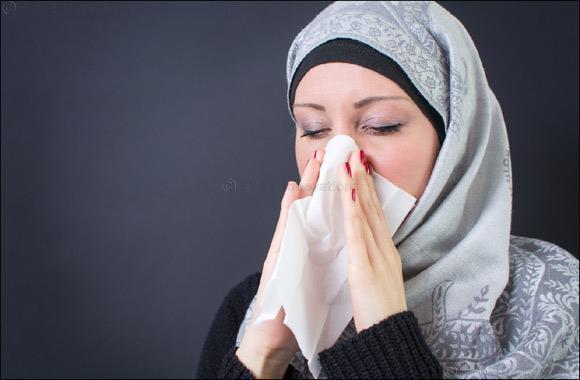
10 tips to beat winter allergies in the UAE
(MENAFN- Dubai PR Network) The cooler weather has triggered a round of seasonal allergies across the Emirates. Sara Alsn, Blueair's Chief Purpose Officer, offers some preventive tips on how to combat seasonal respiratory ailments
With the UAE reporting single-digit temperatures, residents are bracing themselves to deal with a sudden onset of respiratory allergies and asthma attacks caused by the change in weather. As fog and rain coincide with fall pollen season, the situation could become more difficult for those who are vulnerable to atmospheric triggers. Unfortunately, even staying indoors with closed windows won't offer much relief allergens can find their way into people's homes on hair, shoes, clothing and pets. In fact, indoor air can be up to two to five times more polluted than outside air according to the US Environmental Protection Agency (EPA).
The good news is that there is help and Blueair, a world-leader in air purification solutions, has listed the key steps to help prevent hay fever and allergic rhinitis.
1. Vacuum your home regularly
An effective way to remove allergens such as pollen, sand particles, dust, pet dander and the microorganisms they harbour is by using a vacuum cleaner frequently. Use a sealed unit with a bag to trap the dust, so it isn't sent back out into the air. Also, check that the machine has a high-efficiency particulate air (HEPA) filter; these remove at least 99.97% of the ultra-small particles that cause health problems.
2. Wipe down floors and surfaces
Atmospheric allergens are tiny, invisible specks flying around your home. Like dust, these particles find their way onto floors, furniture and other surfaces. A feather duster simply spreads these allergens around, so clean tabletops and other surfaces with a damp microfiber cloth, and mop your floors regularly.
3. Schedule cleaning of your home's air vents
Vacuum and wipe down the air vents in your home on a regular basis, ideally with a damp cloth and an organic cleaner. If you suspect the vents harbour mould or insects or are clogged, you may need to consider professional air duct cleaning.
4. Use an indoor air purifier
From gas burners and cigarette smoke to emissions from paint, upholstery and air fresheners, indoor air harbours many undesirable pollutants, the EPA says. Air purifiers remain the most efficient way to eliminate these pollutants. Blueair units use HEPASilent technology, which removes 99.97% of all harmful particles in a room, so you can sleep well, wake up happy and remain focused all day even if you have hay fever. When buying an air purifier, check for endorsements from health organisations. Asthma Allergy Nordic, the association of allergy and asthma organisations, recommends Blueair's Classic models for people who are sensitive to allergens such as dust and pollen.
5. Invest in dust mite covers
Dust allergies are often a reaction to dust mites, the microscopic creatures that live in your bedding and carpets and feed on dead skin. Encasing your pillows and mattresses in dust mite covers prevents mites from accessing their food source while keeping their waste and body parts that are already in the mattress from becoming airborne.
6. Keep a check on temperature and humidity levels
Maintain indoor temperatures under 21°C and relative humidity in your home below 50% to make it difficult for dust mites and other microorganisms to thrive. These common indoor air allergens fare badly under these conditions.
7. Take your shoes off after you enter the home
Shoes carry dust, pollen and other allergens into homes, which is why Arabic and Asian societies traditionally left their footwear by the door. Make sure to wipe your shoes on a doormat, or leave them by the door to reduce contamination of indoor air.
8. Use a face mask when outdoors
Face masks are rare outside Asia but can be an effective way of filtering out pollen from the air you breathe. A good face mask can make outdoor life bearable again when pollen counts are high.
9. Check allergen levels online
Several websites, including the government-recommended Plume Air Report, track and update the air quality and pollen counts across the UAE. Air pollution leads to more atmospheric particulate matter and a greater chance of allergies. If you live in a big city you may prefer to avoid a rush hour commute.
10. Purify the air in your car
You may not realise it, but the air in your car can be up to 15 times more polluted than on the road outside. Poor air quality within cars is caused by vehicle exhaust as well as microscopic particles, silica crystals, bacteria and dust mites, UAE experts say. An in-car air purifier with HEPASilent technology, such as Blueair Cabin Air, will filter out 99.97% of these impurities.

Legal Disclaimer:
MENAFN provides the
information “as is” without warranty of any kind. We do not accept
any responsibility or liability for the accuracy, content, images,
videos, licenses, completeness, legality, or reliability of the information
contained in this article. If you have any complaints or copyright
issues related to this article, kindly contact the provider above.
















Comments
No comment